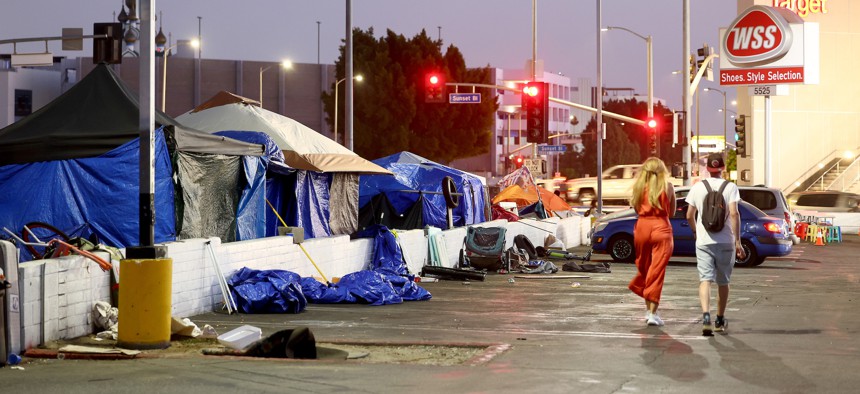Can cities clear homeless camps without offering an alternative?

A homeless encampment in Los Angeles. Mario Tama/Getty Images
The Supreme Court will hear a case on how far local governments can go to enforce bans on sleeping and camping in public spaces.
The U.S. Supreme Court announced last week it will decide whether cities can clear homeless encampments by threatening people living there with criminal prosecution, in a closely watched case that pits housing advocates against city officials throughout the West.
At issue is whether cities can enforce camping bans on public property, without offering residents of those camps an alternative place to rest. For five years, federal courts have ruled that cities must provide people somewhere else to go to avoid prosecution, because otherwise the practice amounts to “cruel and unusual punishment.” But city and state officials blame that policy for the growth of homeless camps in cities such as Phoenix, Seattle and Missoula, Montana.
The case originates from Grants Pass, Oregon, a small city where local ordinances criminalized camping and sleeping in public spaces like parks and sidewalks. Gloria Johnson and John Logan, two people experiencing homelessness in Grants Pass, filed a lawsuit against the city, saying the rules punished homeless people for simply existing.
A trial court in Oregon and the Ninth Circuit U.S. Court of Appeals—which covers several Western states—both sided with the plaintiffs, saying that punishing people for sleeping outdoors when they have nowhere else to go is a form of cruel and unusual punishment and a violation of the Eighth Amendment. The decision in the Grants Pass case follows a 2018 ruling by the Ninth Circuit in Martin v. Boise, which established the “cruel and unusual punishment” argument. Whether those ordinances really violate the Eighth Amendment is at the heart of the Supreme Court dispute.
If the Grants Pass decision is reversed, “it could lead to a situation where all across the country, you can be forced into a relocation camp under threat of arrest, or into jail, just simply because you can't afford rent in your community,” said Eric Tars, senior policy director for the National Homelessness Law Center.
The Supreme Court typically hears a case when appeals courts reach different conclusions, according to Tars. “But here, we don't have that,” he said. “Courts have been pretty consistent across the country, in line with Martin v. Boise and Johnson v. Grants Pass decisions.”
Now though, many state and local officials have voiced opposition to the standard, arguing that the decision ties the hands of governments working to maintain clean, safe streets. Twenty Republican attorneys general filed a friend-of-the court brief in September, urging the high court to consider the case and reverse the decision. They argued that the Ninth Circuit Court has impeded state and local governments’ constitutional right to set rules around land-use issues and public spaces.
“Families can no longer walk the streets of Portland, San Francisco and Seattle in safety,” they wrote. “The pungent smell of urine and human feces fills the air. Hypodermic needles used for narcotics cover the ground. And rats carrying diseases that were once thought eradicated scurry from encampments to nearby businesses and homes. These cities used to be beacons of the West, but their sidewalks are now too dangerous to visit.”
Even Democratic California Gov. Gavin Newsom filed a brief in September urging the high court to consider the case and describing the need to clarify what kinds of restrictions are unconstitutional.
The Johnson v. Grants Pass decision “provides no guidance about how state and local governments can enforce policies to clean encampments or move individuals to safer locations, even when they are not attempting to enforce total bans on the presence of homeless individuals within a particular jurisdiction,” Newsom’s lawyers wrote.
If the Supreme Court overturns the decision and rules in favor of the city, it could kick decisions around camping bans back to the states, similar to how the high court’s 2022 Dobbs decision gave the states authority to set their own abortion restrictions, Tars said.
It’s also important to keep in mind that people of color are most likely to experience homelessness, as are LGBTQ+ people and seniors, he said.
“The disparate impacts of this case are going to run deep.”
Arresting and prosecuting people who have no place to live will make it more difficult for them to escape homelessness, said Steve Berg, chief policy officer for the National Alliance to End Homelessness. A criminal record, for example, will make it harder to secure a job. For those who are employed but still without stable housing, a night in jail could get them fired.
There’s plenty of evidence to support policies that reduce homelessness, including housing-first initiatives and land-use reforms that spur housing development. The cities that implement these practices are the ones seeing the greatest reductions in homelessness, Berg said.
Take Houston, where homelessness has fallen 63% since 2011. The city uses a housing-first approach to move people experiencing homelessness into their own homes and apartments, where some stay for several months while they connect with services like counseling and substance misuse treatment. Once they’re back on their feet, they can more easily secure permanent housing.
Strategies like housing first require collaboration and buy-in from all parties involved: government agencies, nonprofits, residents and people experiencing homelessness. Criminalization, meanwhile, separates people from their support networks. It worsens the situation and often creates more tensions in communities, Berg added.
“If you're someone who's working for people who are homeless and have friends in that community, and the police are locking those people up, it's hard not to view the police as the enemy,” he said. And if police are responsible for enforcing bans on public camping, they’re likely to see unhoused people as adversaries.
”That's just a recipe for more homelessness,” he said.






